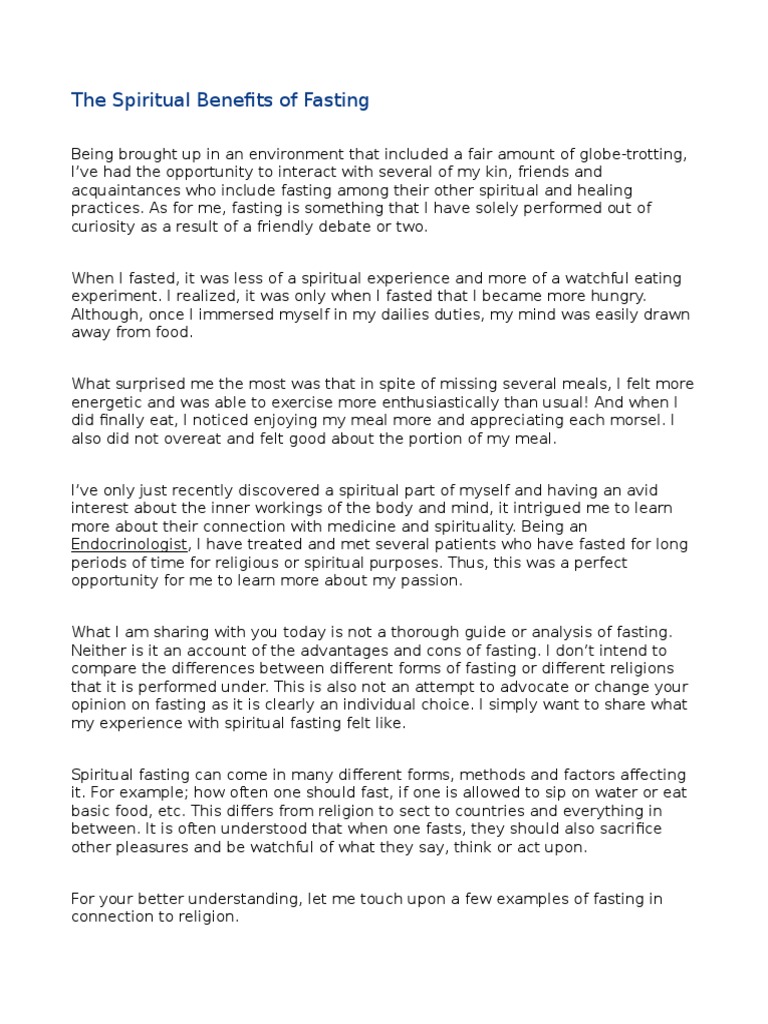The Bahá’í teachings encompass a multitude of spiritual concepts that aim to guide individuals toward a deeper understanding of themselves and their relationships with the Divine. Among these teachings, the practice of fasting stands out as a profound and transformative experience. While many may view fasting as merely an act of abstention from food and drink, in the Bahá’í faith, it is perceived as a multifaceted spiritual journey with myriad benefits that extend far beyond the physical. This article elucidates the spiritual benefits of fasting, grounded in Bahá’í principles and philosophy.
At its core, fasting serves as a mechanism for self-discipline and spiritual purification. The Bahá’í fast occurs annually from March 2 to March 20, a period during which adherents abstain from food and drink from sunrise until sunset. This temporal restriction is not merely an act of physical endurance; rather, it fosters an environment conducive to reflection and spiritual growth. The act of fasting invites individuals to confront their corporeal desires and, in doing so, compels them to seek a heightened state of awareness and connection with their spiritual essence.
One of the salient themes within the Bahá’í teachings centers on the concept of detachment. Fasting facilitates a process of detachment from material concerns and worldly distractions. As individuals refrain from their daily sustenance, they are encouraged to redirect their focus toward spiritual enrichment. This spiritual redirection allows for introspection and a reassessment of one’s priorities, ultimately enabling practitioners to cultivate a more profound relationship with God. The act of willingly relinquishing physical comforts embodies a powerful reminder of the transitory nature of the material world.
Moreover, the period of fasting cultivates a sense of unity and community among Bahá’ís. Participation in this shared experience fosters a collective spirit, as individuals come together to support and encourage one another in their spiritual endeavors. The communal aspect of fasting enhances the feeling of togetherness and fosters empathy towards those who experience hunger and deprivation on a daily basis. Through this shared commitment, Bahá’ís are reminded of their interconnectedness and the importance of contributing to the well-being of humanity.
In conjunction with fostering communal bonds, fasting engenders gratitude. As one’s opportunity for sustenance diminishes during daylight hours, there emerges an increased appreciation for the blessings of food and the act of nourishment. This perspective aligns with the Bahá’í principle of acknowledging the bounty of God’s creations and recognizing the abundance that often goes unnoticed. Such an attitude of gratitude can permeate various facets of one’s life, cultivating a sense of contentment and appreciation for the simplicity of existence.
Additionally, the practice of fasting may serve as a catalyst for personal reflection and growth. The quietude that envelops the fasting period heightens one’s sensitivity to spiritual truths and personal shortcomings. With the absence of physical distractions, individuals can delve into their innermost thoughts and emotions, thereby identifying areas for growth and improvement. This introspective journey is integral to the Bahá’í concept of the soul’s evolution—a process that necessitates continuous learning and development.
As fasting engenders a space for clarity and self-reflection, it also engenders a newfound sense of purpose. Practitioners are encouraged not only to abstain from physical sustenance but also to engage in acts of service and spiritual devotion. This proactive approach transforms an isolated period of deprivation into an opportunity for exaltation and altruism, aligning with the Bahá’í tenet of service to humanity. By engaging in community service, prayer, and reading of sacred texts, individuals epitomize the spirit of fasting and strive to embody the attributes of the Divine.
Importantly, the spiritual benefits of fasting extend to mental fortitude and resilience. The discipline required to adhere to the fasting guidelines fortifies one’s resolve and ability to withstand various forms of adversity. This cultivation of inner strength is invaluable, as it equips individuals with the tools necessary to navigate the complexities of life. Just as the body is temporarily deprived of sustenance, the spirit becomes stronger, more attuned to challenges, and more able to confront obstacles.
Furthermore, the benefits of fasting are interwoven with the Bahá’í perspective on the nature of the soul. It is believed that the soul, which seeks connection with the Divine, thrives in an environment free from distractions. Fasting, therefore, becomes a spiritual exercise that paradoxically nourishes the soul by depriving the body. This intimate relationship between physical restraint and spiritual nourishment is foundational to the belief system, illustrating the balance that exists between the material and spiritual realms.
In conclusion, fasting within the Bahá’í faith transcends the mere act of abstaining from food and drink. It is a holistic practice that propels believers toward spiritual awakening, communal solidarity, and personal introspection. The multifaceted benefits of fasting serve as a testament to its significance within Bahá’í teachings, ultimately guiding adherents toward a deeper connection with the Divine and a more profound understanding of their role in the fabric of humanity. By embracing the principles of fasting, individuals embark on a transformative journey that enriches their spiritual lives and fosters an unyielding commitment to the betterment of the world.
